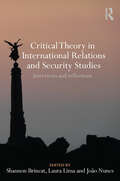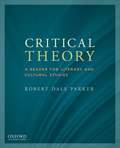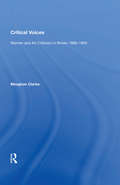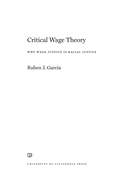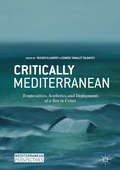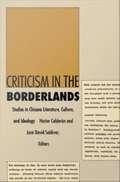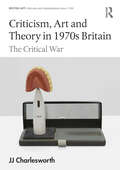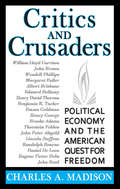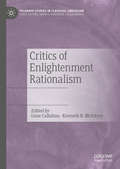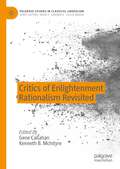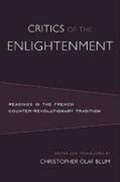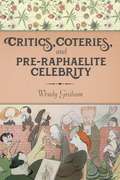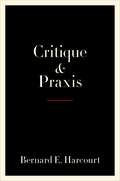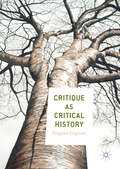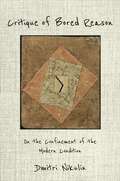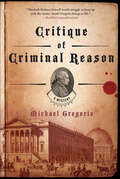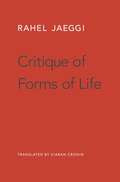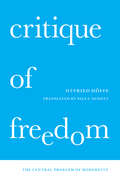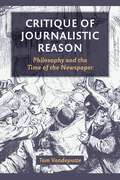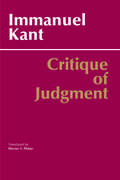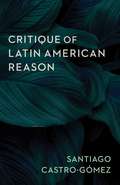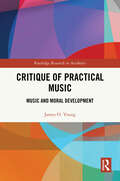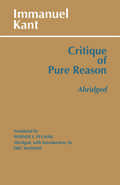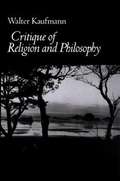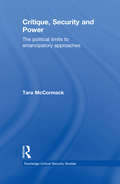- Table View
- List View
Critical Theory in International Relations and Security Studies: Interviews and Reflections
by Laura Lima Shannon Brincat João NunesThis book provides an assessment of the legacy, challenges and future directions of Critical Theory in the fields of International Relations and Security Studies. This book provides ‘first-hand’ interviews with some of the pioneers of Critical Theory in the fields of International Relations Theory and Security Studies. The interviews are combined innovatively with reflective essays to create an engaging and accessible discussion of the legacy and challenges of critical thinking. A unique forum that combines first-person discussion and secondary commentary on a variety of theoretical positions, the book explores in detail the interaction between different theories and approaches, including postcolonialism, feminism, and poststructuralism. Scholars from a variety of theoretical backgrounds reflect on the strengths and problems of critical theory, recasting the theoretical discussion about critical theory in the study of world politics and examining the future of the discipline. Both an introduction and an advanced engagement with theoretical developments over the past three decades, Critical Theory in International Relations and Security Studies will be of interest to students and scholars of International Politics, Security Studies and Philosophy.
Critical Theory: A Reader for Literary and Cultural Studies
by Robert Dale ParkerThis book presents a provocative mix of contemporary and classic essays in critical theory. From the foundational ideas of Marx and Freud to key writings by Fanon and Foucault, the essays in this collection represent the most influential ideas in modern critical thought and in the contemporary interpretation of literature and culture.
Critical Voices: Women and Art Criticism in Britain 1880-1905
by Meaghan ClarkeCritical Voices is a fascinating account of women writing about art in Britain at the turn of the twentieth century. Meaghan Clarke employs extensive original research in order to demonstrate the significant contribution made by women to the art world and draws on a diversity of sources, including diaries, letters and periodicals, to highlight the many different forms their criticism took. Focusing in particular on the work of three women - Alice Meynell, Florence Fenwick-Miller and Elizabeth Robins Pennell - Clarke argues that in order to understand fully art debates of the time it is essential we broaden our understanding of the role of women in the construction of art history. John Singer Sargent, James MacNeill Whistler, Edgar Degas, Mary Cassatt, Elizabeth Butler, William Holman Hunt, Frederic Leighton, Walter Sickert, Henrietta Rae, and Rosa Bonheur are among the artists considered.
Critical Wage Theory: Why Wage Justice Is Racial Justice
by Ruben J. GarciaIn this highly original and personal book, Ruben J. Garcia argues forcefully that we must center the minimum wage as a tool for fighting structural racism. Employing the lessons of critical race theory to show how low minimum wages and underenforcement of workplace laws have always been features of our racially stratified society, Garcia explains why we must follow the leadership of social movements by treating increases in minimum wage levels and enforcement as matters of racial justice. Offering solutions that would benefit all workers, especially the immigrants and people of color most often made victims of wage theft, Critical Wage Theory is essential reading for anyone who seeks a more just future for the working class.
Critically Mediterranean: Temporalities, Aesthetics, And Deployments Of A Sea In Crisis (Mediterranean Perspectives)
by Edwige Tamalet Talbayev Yasser ElhariryTraversed by masses of migrants and wracked by environmental and economic change, the Mediterranean has come to connote crisis. In this context, Critically Mediterranean asks how the theories and methodologies of Mediterranean studies may be brought to bear upon the modern and contemporary periods. Contributors explore how the Mediterranean informs philosophy, phenomenology, the poetics of time and space, and literary theory. Ranging from some of the earliest twentieth-century material on the Mediterranean to Edmond Amran El Maleh, Christoforos Savva, Orhan Pamuk, and Etel Adnan, the essays ask how modern and contemporary Mediterraneans may be deployed in political, cultural, artistic, and literary practice. The critical Mediterranean that emerges is plural and performative—a medium through which subjects may negotiate imagined relations with the world around them. Vibrant and deeply interdisciplinary, Critically Mediterranean offers timely interventions for a sea in crisis.
Criticism in the Borderlands: Studies in Chicano Literature, Culture, and Ideology
by Héctor Calderón José David SaldívarThis pathbreaking anthology of Chicano literary criticism, with essays on a remarkable range of texts--both old and new--draws on diverse perspectives in contemporary literary and cultural studies: from ethnographic to postmodernist, from Marxist to feminist, from cultural materialist to new historicist. The editors have organized essays around four board themes: the situation of Chicano literary studies within American literary history and debates about the "canon"; representations of the Chicana/o subject; genre, ideology, and history; and the aesthetics of Chicano literature. The volume as a whole aims at generating new ways of understanding what counts as culture and "theory" and who counts as a theorist. A selected and annotated bibliography of contemporary Chicano literary criticism is also included. By recovering neglected authors and texts and introducing readers to an emergent Chicano canon, by introducing new perspectives on American literary history, ethnicity, gender, culture, and the literary process itself, Criticism in the Borderlands is an agenda-setting collection that moves beyond previous scholarship to open up the field of Chicano literary studies and to define anew what is American literature. Contributors. Norma Alarcn, Hctor Caldern, Angie Chabram, Barbara Harlow, Rolando Hinojosa, Luis Leal, Jos E. Limn, Terese McKenna, Elizabeth J. Ordez, Genero Padilla, Alvina E. Quintana, Renato Rosaldo, Jos David Saldvar, Sonia Saldvar-Hull, Rosaura Snchez, Roberto Trujillo
Criticism, Art and Theory in 1970s Britain: The Critical War (ISSN)
by JJ CharlesworthA critical study of the life of art criticism in the 1970s, this volume traces the evolution of art and art criticism in a pivotal period in post-war British history.JJ Charlesworth explores how art critics and the art press attempted to negotiate new developments in art, faced with the challenges of conceptualism, alternative media, new social movements and radical innovations in philosophy and theory. This is the first comprehensive study of the art press and art criticism in Britain during this pivotal period, seen through the lens of its art press, charting the arguments and ideas that would come to shape contemporary art as we know it today.This book will be of interest to scholars working in art history, British cultural history and history of journalism.
Critics and Crusaders: Political Economy and the American Quest for Freedom
by Wilton S. DillonThe quest for freedom has always been a defining characteristic of the American people. That neither constitutionalism nor capitalism has secured complete freedom for every person is demonstrated by media announcements of slavery, oppression, exploitation, and a variety of shortcomings in the economic system. That said, and as this volume seeks to demonstrate through a history of radical commentaries, there have always been bold spirits who fight for such ambitious heights.With changing times, freedom meant different things to those who worked for it. This book in its broadest sense is a history of libertarianism. Each of the libertarians in this full study, extending from William Lloyd Garrison to Eugene V. Debs, fought for the ideal of political economy as a practical ideal. In so doing these major figures at the margins of power expanded the entire field of human rights. Charles A. Madison concludes that radicalism became an ideology in the search for freedom.The zeal and activity of these figures did much to attain the political freedom and economic well- being that Americans are inclined to take for granted. These individual chapters are set in frames supplied by background sketches of the movements each group led, and the whole is an attempt to depict and re-evaluate America's social progress without the rigor or formality of impersonalized history.
Critics of Enlightenment Rationalism (Palgrave Studies in Classical Liberalism)
by Gene Callahan Kenneth B. McIntyreThis book provides an overview of some of the most important critics of “Enlightenment rationalism.” The subjects of the volume—including, among others, Burke, Kierkegaard, Nietzsche, T.S. Eliot, Wittgenstein, Heidegger, C.S. Lewis, Gabriel Marcel, Russell Kirk, and Jane Jacobs—do not share a philosophical tradition as much as a skeptical disposition toward the notion, common among modern thinkers, that there is only one standard of rationality or reasonableness, and that that one standard is or ought to be taken from the presuppositions, methods, and logic of the natural sciences. The essays on each thinker are intended not merely to offer a commentary on that thinker, but also to place that thinker in the context of this larger stream of anti-rationalist thought. Thus, while this volume is not a history of anti-rationalist thought, it may contain the intimations of such a history.
Critics of Enlightenment Rationalism Revisited (Palgrave Studies in Classical Liberalism)
by Gene Callahan Kenneth B. McIntyreThis book provides an overview of some of the most important critics of “Enlightenment rationalism.” The subjects of the volume (including, among others, Pascal, Vico, Schmitt, Weber, Anscombe, Scruton, and Tolkien) do not share a philosophical tradition as much as a skeptical disposition toward the notion, common among modern thinkers, that there is only one standard of rationality or reasonableness, and that that one standard is or ought to be taken from the presuppositions, methods, and logic of the natural sciences. The essays on each thinker are intended not merely to offer a commentary on that thinker, but also to place the person in the context of this larger stream of anti-rationalist thought.
Critics of the Enlightenment: Readings in the French Counter-Revolutionary Tradition
by Christopher Olaf BlumCritics of the Enlightenment: Readings in the French Counter-Revolutionary Tradition
Critics, Coteries, and Pre-Raphaelite Celebrity (Gender and Culture Series)
by Wendy GrahamFounded by a band of young iconoclasts, the Pre-Raphaelite Brotherhood stunned Victorian England with its revaluation of culture and lifestyle. With Pre-Raphaelitism ascendant in the 1850s and canonical by the 1880s, the movement’s refractory reception history is an object lesson in how avant-gardes burst upon the scene, dispense with their antagonistic posture, and become a mainstay of tradition. Wendy Graham traces the critical discourses that greeted the Pre-Raphaelites’ debut, shaped their contemporary reception, and continued to inform responses to them well after their heyday. She explains the mechanics of fame and the politics of scandal contributing to the rise of aestheticism, providing a new interpretation of the place of aesthetic counterculture in Victorian England.Critics, Coteries, and Pre-Raphaelite Celebrity sheds new light on Victorian discourses on sexuality and masculinity through a thick description of literary bravado, the emotions of male bonding within cliques, and homoerotic frissons among the creators and reviewers of Pre-Raphaelitism. Graham threads together the qualities that made William Holman Hunt, John Everett Millais, and Gabriel Rossetti exemplary figures of aesthetic celebrity in the 1850s; Algernon Swinburne and Simeon Solomon in the 1860s; and Edward Burne-Jones and Walter Pater in the 1870s. The book documents the symbiotic relationship between periodical writers and the artists and poets they helped make famous, demonstrating that the origin myth of Bohemian artistic transcendence was connected with the rise of a professional class of journalists. Graham shows that the Pre-Raphaelites innovated many of the phenomena now associated with Oscar Wilde, arguing that they were foundational for him in forging an artistic and personal identity with a full-blown publicity apparatus. Wilde had models. This book is about them.
Critique and Praxis
by Bernard E. HarcourtCritical philosophy has always challenged the division between theory and practice. At its best, it aims to turn contemplation into emancipation, seeking to transform society in pursuit of equality, autonomy, and human flourishing. Yet today’s critical theory often seems to engage only in critique. These times of crisis demand more.Bernard E. Harcourt challenges us to move beyond decades of philosophical detours and to harness critical thought to the need for action. In a time of increasing awareness of economic and social inequality, Harcourt calls on us to make society more equal and just. Only critical theory can guide us toward a more self-reflexive pursuit of justice. Charting a vision for political action and social transformation, Harcourt argues that instead of posing the question, “What is to be done?” we must now turn it back onto ourselves and ask, and answer, “What more am I to do?”Critique and Praxis advocates for a new path forward that constantly challenges each and every one of us to ask what more we can do to realize a society based on equality and justice. Joining his decades of activism, social-justice litigation, and political engagement with his years of critical theory and philosophical work, Harcourt has written a magnum opus.
Critique as Critical History
by Bregham DalglieshThis book presents the first sustained articulation of a Foucauldian oeuvre. It situates Foucault's critique within the tradition of Kant's call for a philosophical archaeology of reason; in parallel, it demonstrates the priority in Foucault's thought of Nietzsche over Heidegger and the framing of reason against an ontology of power. Bregham Dalgliesh hereby claims that at the heart of the Foucauldian oeuvre is the philosophical method of critical history. Its task is to make the will to know that drives thought conscious of itself as a problem, especially the regimes of truth that define our governmentalities. By revealing the contingency of their constituent parts of knowledge, power and ethics, Dalgliesh demonstrates that critical history offers an alternative mode of critique to the hithertofore singular reading of the intellectual heritage of enlightenment, while it fosters an agonistic concept of freedom in respect of our putatively necessary limits.
Critique of Bored Reason: On the Confinement of the Modern Condition
by Dmitri NikulinMost of the core concepts of the Western philosophical tradition originate in antiquity. Yet boredom is strikingly absent from classical thought. In this philosophical study, Dmitri Nikulin explores the concept’s genealogy to argue that boredom is the mark of modernity.Nikulin contends that boredom is a specifically modern phenomenon. He provides a critical reconstruction of the concept of the modern subject as universal, rational, autonomous, and self-sufficient. Understanding itself in this way, this subject is at once the protagonist, playwright, director, and spectator of the staged drama of human existence. It is therefore inevitably monological, lonely, and alone, and can neither escape its own presence nor get rid of it. In other words, it is bored—and this boredom is the fundamental expression and symptom of the modern condition.Considering such thinkers as Descartes, Pascal, Kant, Kierkegaard, Kracauer, Heidegger, and Benjamin, Critique of Bored Reason places boredom on center stage in the philosophical critique of modernity. Nikulin also considers the alternative to the notion of the autonomous subject in the—nonbored and nonboring—dialogic and comic subject capable of shared existence with others.
Critique of Criminal Reason: A Mystery
by Michael GregorioMost honourable Procurator Stiffeniis, You talents have been brought to Our attention by a gentleman of eminence, who believes that you alone are capable of resolving a situation which holds Our beloved Königsberg in a grip of terror. All Our faith and consideration are due to the notable personage who suggested your name, and that same faith and consideration now resides in you. We have no reason to doubt that you will accept this Royal Commission, and act accordingly with all haste. The fate of the city lies in your hands.--King Frederick Wilhelm IIIIt has been years since Immanuel Kant's landmark philosophical work, Critique of Pure Reason, brought him fame throughout Europe and made him Königsberg's best-known citizen. Now, rumors have begun to surface of a new work by this aging but still acute mind. Yet unlike his earlier work, this book will not examine the mind of the average man, but the mind of the serial killer.Hanno Stiffeniis, a young magistrate, has been called to Königsberg to assist in the investigation of an enigmatic string of murders. Is it part of a plot formed by Napoleon's spies to undermine the Prussian king or the work of a solitary, unknown killer? The case would seem unsolvable, were it not for the assistance and unmatched intellect of his mentor, Immanuel Kant. Together Stiffeniis and the elderly, eccentric philosopher must track down the killer who has the city of Königsberg by the throat.Hugely atmospheric, entertaining, and intelligent, Critique of Criminal Reason marks the outstanding debut of a new name in historical fiction.
Critique of Forms of Life
by Rahel JaeggiFor liberals, the question “Do others live rightly?” seems to demand a follow-up question: “Who am I to judge?” Peaceful coexistence, in this view, is predicated on restraint from morally evaluating our peers. But Rahel Jaeggi argues that criticizing is not only valid but also useful. Moral judgment is no error—the error lies in how we go about it.
Critique of Freedom: The Central Problem of Modernity
by Otfried HöffeIn this ambitious book, philosopher Otfried Höffe provides a sophisticated account of the principle of freedom and its role in the project of modernity. Höffe addresses a set of complex questions concerning the possibility of political justice and equity in the modern world, the destruction of nature, the dissolving of social cohesion, and the deregulation of uncontrollable markets. Through these considerations, he shows how the idea of freedom is central to modernity, and he assesses freedom’s influence in a number of cultural dimensions, including the natural, economic and social, artistic and scientific, political, ethical, and personal-metaphysical. Neither rejecting nor defending freedom and modernity, he instead explores both from a Kantian point of view, looking closely at the facets of freedom’s role and the fundamental position it has taken at the heart of modern life. Expanding beyond traditional philosophy, Critique of Freedom develops the building blocks of a critical theory of technology, environmental protection, economics, politics, medicine, and education. With a sophisticated yet straightforward style, Höffe draws on a range of disciplines in order to clearly distinguish and appreciate the many meanings of freedom and the indispensable role they play in liberal society.
Critique of Journalistic Reason: Philosophy and the Time of the Newspaper
by Tom VandeputteAn encounter between philosophy and journalism recurs across the modern philosophical tradition. Images of reporters and newspaper readers, messengers and town criers, announcements and rumors populate the work of such thinkers as Kierkegaard, Nietzsche, and Benjamin. This book argues that these three thinkers’ preoccupation with journalism cannot be separated from their philosophy “proper” but plays a pivotal role in their philosophical work, where it marks an important nexus between their theories of history, time, and language. Journalism, in the tradition Vandeputte brings to light, figures before anything else as a cipher of the time in which philosophy is written. If the journalist and newspaper reader characterize what Kierkegaard calls “the present age,” that is because they exemplify a present marked by the crisis of the philosophy of history—a time after the demise of history as a philosophizable concept. In different ways, the pages of the newspaper appear in the European philosophical tradition as a site where teleological and totalizing representations of history must founder, together with the conceptions of progress and development that sustain them.But journalism does not simply mark the end of philosophy; for Kierkegaard, Nietzsche, and Benjamin, journalistic writing also takes on an exemplary role in the attempt to think time and history in the wake of this demise. The concepts around which these attempts crystallize—Kierkegaard’s “instant,” Nietzsche’s “untimeliness,” and Benjamin’s “actuality”—all emerge from the philosophical confrontation with journalism and its characteristic temporalities.
Critique of Judgment
by Immanuel Kant Werner S. Pluhar Mary J. GregorPluhar maintains a fine, even tone throughout. . . . Those who have found the prospect of teaching the third Critique daunting will admire its clarity. . . . No one will be disappointed. --Timothy Sean Quinn, The Review of Metaphysics
Critique of Latin American Reason
by Santiago Castro-GómezCritique of Latin American Reason is one of the most important philosophical texts to have come out of South America in recent decades. First published in 1996, it offers a sweeping critique of the foundational schools of thought in Latin American philosophy and critical theory.Santiago Castro-Gómez argues that “Latin America” is not so much a geographical entity, a culture, or a place, but rather an object of knowledge produced by a family of discourses in the humanities that are inseparably linked to colonial power relationships. Using the archaeological and genealogical methods of Michel Foucault, he analyzes the political, literary, and philosophical discourses and modes of power that have contributed to the making of “Latin America.” Castro-Gómez examines the views of a wide range of Latin American thinkers on modernity, postmodernity, identity, colonial history, and literature, also considering how these questions have intersected with popular culture. His critique spans Central and South America, and it also implicates broader and protracted global processes.This book presents this groundbreaking work of contemporary critical theory in English translation for the first time. It features a foreword by Linda Martín Alcoff, a new preface by the author, and an introduction by Eduardo Mendieta situating Castro-Gómez’s thought in the context of critical theory in Latin America and the Global South. Two appendixes feature an interview with Castro-Gómez that sheds light on the book’s composition and short provocations responding to each chapter from a multidisciplinary forum of contemporary scholars who resituate the work within a range of perspectives including feminist, Francophone African, and decolonial Black political thought.
Critique of Practical Music: Music and Moral Development (Routledge Research in Aesthetics)
by James O. YoungThis book offers a systematic survey of ethos theory: the theory according to which the right sort of music can have a positive or negative effect on moral development. It also evaluates the extant empirical literature on music and moral development.The belief that the right sort of music promotes moral development is almost ubiquitous. At every stage in the history of philosophical thinking, many philosophers have believed that the right sort of music is conducive to moral improvement and the wrong kind of music can produce moral decay. This book has three main goals. The first is to inform readers about the range of thinkers and cultures (Asian, African and European) which have adopted some version of the ethos theory. The book surveys the history of ethos theory starting with its origins in ancient Greece and ancient China, proceeding to trace its development through the Middle Ages and into the early modern period. Next, the development of ethos theory is traced from the middle of the nineteenth century to the present. The second goal is to investigate what would count as evidence that ethos theory is correct, paying specific attention to the complex ways that people experience music. Finally, the author evaluates the currently available empirical evidence for ethos theory.Critique of Practical Music will appeal to philosophers, psychologists, musicologists and music educators who are interested in music and moral development.
Critique of Pure Reason, Abridged
by Immanuel Kant Eric Watkins Werner S. PluharThis thoughtful abridgment makes an ideal introduction to Kant's Critique of Pure Reason. Key selections include: the Preface in B, the Introduction, the Transcendental Aesthetic, the Second Analogy, the Refutation of Idealism, the first three Antinomies, the Transcendental Deduction in B, and the Canon of Pure Reason. A brief introduction provides biographical information, descriptions of the nature of Kant's project and of how each major section of the Critique contributes to that project. A select bibliography and index are also included.
Critique of Religion and Philosophy
by Walter KaufmannThis book presents a detailed understanding, sympathy, and criticism of both existentialism and analytic philosophy in addition to careful critique of neo-orthodoxy, the Higher Criticism, demythologizing, mysticism, Freudian psychology, and certain aspects of Judaism and Buddhism.
Critique, Security and Power: The Political Limits to Emancipatory Approaches (Routledge Critical Security Studies)
by Tara MccormackThis book aims to engage with contemporary security discourses from a critical perspective. It argues that rather than being a radical, analytical outlook, much critical security theory fails to fulfil its promise to pose a challenge to contemporary power relations. In general, 'critical security' theories and dialogues are understood to be progressive theoretical frameworks that offer a trenchant evaluation and analysis of contemporary international and national security policy. Tara McCormack investigates the limitations of contemporary critical and emancipatory theorising and its relationship with contemporary power structures. Beginning with a theoretical critique and moving into a case study of the critical approaches to the break up of the former Yugoslavia, this book assesses the policies adopted by the international community at the time to show that much contemporary critical security theory and discourse in fact mirrors shifts in post-Cold War international and national security policy. Far from challenging international power inequalities and offering an emancipatory framework, contemporary critical security theory inadvertently ends up serving as a theoretical justification for an unequal international order. This book will be of much interest to students of critical security studies, international relations and security studies. Tara McCormack is Lecturer in International Politics at the University of Leicester and has a PhD in International Relations from the University of Westminster.
